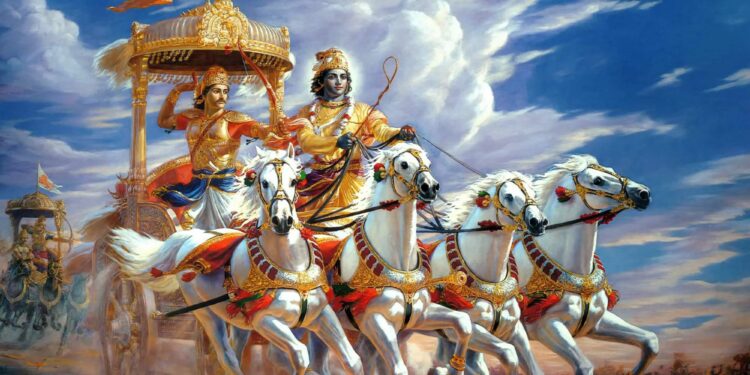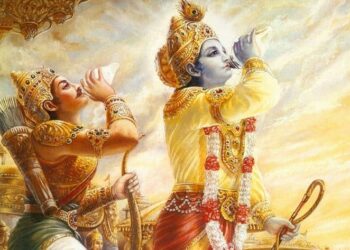TEXT 18
vistareṇātmano yogaṁ
vibhūtiṁ ca janārdana
bhūyaḥ kathaya tṛptir hi
śṛṇvato nāsti me ‘mṛtam
SYNONYMS
vistareṇa—in detail; ātmanaḥ—Your; yogam—mystic power; vibhūtim—opulences; ca—also; jana-ardana—O killer of the atheists; bhūyaḥ—again; kathaya—describe; tṛptiḥ—satisfaction; hi—certainly; śṛṇvataḥ—hearing; na asti—there is not; me—my; amṛtam—nectar.
TRANSLATION
O Janārdana, again please describe in detail the mystic power of Your opulences. I am never satiated in hearing about You, for the more I hear the more I want to taste the nectar of Your words.
PURPORT
A similar statement was made to Sūta Gosvāmī by the ṛṣis of Naimiṣāraṇya, headed by Śaunaka. That statement is:
vayaṁ tu na vitṛpyāma
uttama-śloka-vikrame
yac chṛṇvatāṁ rasa-jñānāṁ
svādu svādu pade pade
“One can never be satiated even though one continuously hears the transcendental pastimes of Kṛṣṇa, who is glorified by excellent prayers. Those who have entered into a transcendental relationship with Kṛṣṇa relish at every step the descriptions of the pastimes of the Lord.” (Śrīmad-Bhāgavatam 1.1.19) Thus Arjuna is interested in hearing about Kṛṣṇa, and specifically how He remains as the all-pervading Supreme Lord.
Now as far as amṛtam, nectar, is concerned, any narration or statement concerning Kṛṣṇa is just like nectar. And this nectar can be perceived by practical experience. Modern stories, fiction and histories are different from the transcendental pastimes of the Lord in that one will tire of hearing mundane stories but one never tires of hearing about Kṛṣṇa. It is for this reason only that the history of the whole universe is replete with references to the pastimes of the incarnations of Godhead. The Purāṇas are histories of bygone ages that relate the pastimes of the various incarnations of the Lord. In this way the reading matter remains forever fresh, despite repeated readings.
TEXT 19
śrī-bhagavān uvāca
hanta te kathayiṣyāmi
divyā hy ātma-vibhūtayaḥ
prādhānyataḥ kuru-śreṣṭha
nāsty anto vistarasya me
SYNONYMS
śrī-bhagavān uvāca—the Supreme Personality of Godhead said; hanta—yes; te—unto you; kathayiṣyāmi—I shall speak; divyāḥ—divine; hi—certainly; ātma-vibhūtayaḥ—personal opulences; prādhānyataḥ—which are principal; kuru-śreṣṭha—O best of the Kurus; na asti—there is not; antaḥ—limit; vistarasya—to the extent; me—My.
TRANSLATION
The Supreme Personality of Godhead said: Yes, I will tell you of My splendorous manifestations, but only of those which are prominent, O Arjuna, for My opulence is limitless.
PURPORT
It is not possible to comprehend the greatness of Kṛṣṇa and His opulences. The senses of the individual soul are limited and do not permit him to understand the totality of Kṛṣṇa’s affairs. Still the devotees try to understand Kṛṣṇa, but not on the principle that they will be able to understand Kṛṣṇa fully at any specific time or in any state of life. Rather, the very topics of Kṛṣṇa are so relishable that they appear to the devotees as nectar. Thus the devotees enjoy them. In discussing Kṛṣṇa’s opulences and His diverse energies, the pure devotees take transcendental pleasure. Therefore they want to hear and discuss them. Kṛṣṇa knows that living entities do not understand the extent of His opulences; He therefore agrees to state only the principal manifestations of His different energies. The word prādhānyataḥ (“principal”) is very important because we can understand only a few of the principal details of the Supreme Lord, for His features are unlimited. It is not possible to understand them all. And vibhūti, as used in this verse, refers to the opulences by which He controls the whole manifestation. In the Amara-kośa dictionary it is stated that vibhūti indicates an exceptional opulence.
The impersonalist or pantheist cannot understand the exceptional opulences of the Supreme Lord nor the manifestations of His divine energies. Both in the material world and in the spiritual world His energies are distributed in every variety of manifestation. Now Kṛṣṇa is describing what can be directly perceived by the common man; thus part of His variegated energy is described in this way.



















